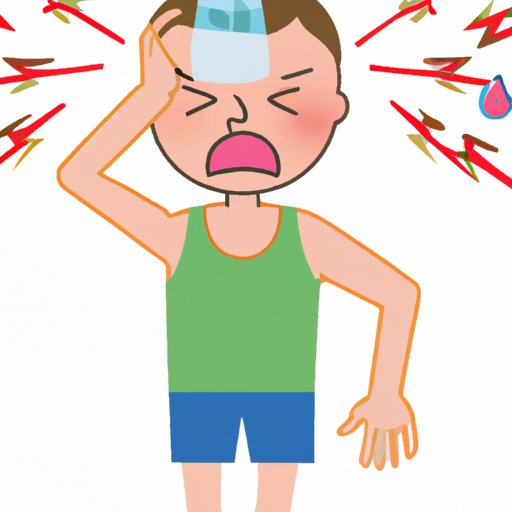Introduction
It’s not uncommon for people to feel dizzy after exercising. In fact, feeling lightheaded or unsteady after a workout is quite common. But why does it happen? And what can you do to prevent it? This article will explore the causes of post-exercise dizziness and provide solutions to help reduce symptoms.

Exploring the Causes of Dizziness After Exercise
There are several potential causes of feeling dizzy after exercise. Some of these include dehydration, over-exertion, cardiovascular fitness level, and low blood sugar.
Dehydration
Sweating during exercise causes the body to lose water. If you don’t drink enough fluids before, during, and after exercise, you can become dehydrated. Dehydration can cause dizziness, weakness, fatigue, headaches, and even fainting spells. A study published in The American Journal of Clinical Nutrition found that mild dehydration can cause a decrease in mental performance, including concentration and short-term memory.
Over-Exertion
If you push your body too hard by exercising too intensely or for too long, it can lead to feelings of dizziness. According to a report in Sports Health, over-exertion can cause a decrease in blood pressure which can lead to lightheadedness and dizziness. Over-exertion can also lead to exhaustion, muscle soreness, and nausea.
Cardiovascular Fitness Level
If you’re new to exercise or if you’ve been sedentary for a while, your body may not be used to the physical demands of exercise. As your cardiovascular fitness level improves with regular exercise, you’ll be better able to tolerate more intense workouts without feeling dizzy. A study published in Medicine & Science in Sports & Exercise found that improved aerobic fitness leads to improved cardiovascular control and tolerance to dynamic exercise.
Low Blood Sugar
If you’re exercising on an empty stomach, your blood sugar levels may drop too low. Low blood sugar can lead to feelings of dizziness, confusion, and fatigue. Eating a healthy snack before exercising can help keep your blood sugar levels stable and reduce symptoms of dizziness.
Solutions to Prevent Dizziness After Exercise
If you’re experiencing dizziness after exercising, there are some steps you can take to reduce symptoms.
Hydrate Before and After Exercise
Proper hydration is essential for maintaining good health and reducing dizziness after exercise. Drink plenty of fluids before, during, and after exercise to stay hydrated. The American College of Sports Medicine recommends drinking 17 to 20 ounces of fluid two hours before exercise and 7 to 10 ounces of fluid every 10 to 20 minutes during exercise.
Start Slowly and Build Up Endurance
If you’re new to exercise or if you’ve been sedentary for a while, start slowly and gradually increase the intensity of your workouts. Be sure to listen to your body and stop if you feel any signs of dizziness. As your body gets stronger and your cardiovascular fitness level improves, you’ll be able to tolerate more intense workouts without feeling dizzy.
Increase Cardio Fitness Level Gradually
Increasing your cardiovascular fitness level gradually is key to avoiding dizziness after exercise. Start with low intensity exercises, such as walking or swimming, and gradually increase the intensity of your workouts as your fitness level improves. A study published in Medicine & Science in Sports & Exercise found that increasing aerobic fitness helps improve cardiovascular control and tolerance to dynamic exercise.
Eat Healthy Snacks Before Exercise
Eating a healthy snack before exercising can help keep your blood sugar levels stable. Choose snacks that are high in complex carbohydrates and protein, such as a piece of whole wheat toast with peanut butter or an apple with a handful of nuts. Avoid sugary snacks, as these can cause a rapid spike in blood sugar followed by a crash.
Conclusion
Feeling dizzy after exercising is common but can be concerning. Fortunately, there are steps you can take to reduce symptoms. Common causes of post-exercise dizziness include dehydration, over-exertion, cardiovascular fitness level, and low blood sugar. To prevent dizziness after exercise, make sure to drink plenty of fluids before and after exercising, start slowly and build up endurance, increase cardio fitness level gradually, and eat healthy snacks before exercise. If you continue to experience dizziness after exercising, seek professional medical advice.
(Note: Is this article not meeting your expectations? Do you have knowledge or insights to share? Unlock new opportunities and expand your reach by joining our authors team. Click Registration to join us and share your expertise with our readers.)
